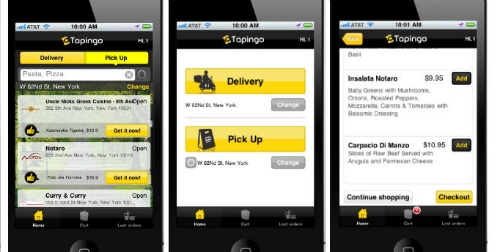Tap on Tapingo to order burgers or pizza for lunch. Let the Israeli computer wizards worry about how it works.

Got the taste for a taco but don’t want to take the trip to Taco Bell? Lusting for latte but already late for work with no time to wait in line at Starbucks? Guy Bauman feels your pain.
Bauman is the VP of marketing and business development at Tapingo, an Israeli startup that wants to app-ify the business of fast food. And that’s just the start: Chocolates, flowers and even department-store bargain basements are only a short jump away for this ambitious Tel Aviv-based company.
Tapingo is an app for iPhone, Android and BlackBerry devices that lets you order from a mobile menu, pay from your phone and specify a time to pick up your quarter-pounder or have it delivered in time for lunch.
The concept sounds simple enough – you can already order everything from concert tickets to cat food online – but purchasing static items that can be shipped in a day or a week is an entirely different ball game from food, which must be prepared on a tight timeline.
To do that, Tapingo must perform some acrobatic maneuvers behind the scenes, plugging directly into the POS (point of sales) system that runs a restaurant. To borrow a fast-food metaphor, that’s the company’s secret sauce. And it’s anything but simple.
“The POS market is very fragmented,” Bauman explains to ISRAEL21c. “There are many companies and no standard in terms of … how to integrate software from third parties” like Tapingo. Moreover, “business owners don’t want to install any new hardware. It has to be completely seamless.”
Restaurateurs also don’t want to pay up front for a new, relatively untested service. Tapingo has got that covered: The firm only takes a cut of the order – somewhat higher than 3.5 percent average that credit card companies charge merchants.
Standardized mobile ordering
Tapingo isn’t the only app that allows diners to order electronically. Many eateries, like Starbucks, have their own apps. The difference, says Bauman, is that those are “branded versions of an existing e-commerce platform.”
That means that each ordering system looks and works differently. With Tapingo, it’s all standardized to be more consumer-friendly. “People don’t want to have 20 different fast food apps on their screens, each with its own interface.”
Tapingo quietly launched the service earlier this year and today has about 100 restaurants signed up in central Tel Aviv and Ramat Gan. For tourists’ convenience, all the menus are translated into English.
By building a single app for many restaurants, Tapingo can take a diner’s credit card information just once, then allow the user to enter a password to pay. The same concept has made it comfortable to buy music or movies on iTunes, Bauman points out.
And, as with iTunes and other major e-commerce platforms, Tapingo will “learn” your preferences. “If we notice that you never order anything with meat in it, the system might assume you’re a vegetarian, so it won’t offer all the meat dishes next time, so you don’t get overwhelmed by a long menu.”
The app will also remember what you ordered last time. If you habitually order a tuna sandwich with potato salad for the Monday staff meeting, you can do that with a single click. If the restaurant runs out of poppy-seed bagels, the app can suggest an alternative.
Found money for fast food
Tapingo isn’t trying to compete with three-star Michelin restaurants, where service and ambience are an integral part of the experience, Bauman says. But for pizza or sushi takeout joints, streamlining the process is like “found money.”
The POS companies seem to agree. Bauman says Tapingo is working with all four of the point-of-sale firms in Israel and two of the biggest POS companies in the United States, which is where Tapingo plans its first overseas expansion as early as the end of this year.
Bauman believes the time is right. “eBay did two million transactions via mobile phone last year; Starbucks has done three million in just three months since it launched its mobile app,” he says.
Tapingo didn’t start out hungry for Chinese take-away. The company was founded by three guys from the fabled 8200 unit in the army that has produced some of the leading high-tech entrepreneurs in Israel. They built a “complete mobile commerce platform aimed at brick-and-mortar shops,” Bauman explains. But the initial vision was too broad and the focus soon narrowed to fast food, at least for now.
Tapingo has a staff of 15 and has been entirely self-funded to date, although the company is closing a first round of venture capital. Bauman, like the company’s CEO Daniel Almog (who graduated from Harvard in computer science before joining 8200), is Israeli-born but grew up mostly in the US. The company has R&D in Israel, and is opening a sales and marketing division in New York.













